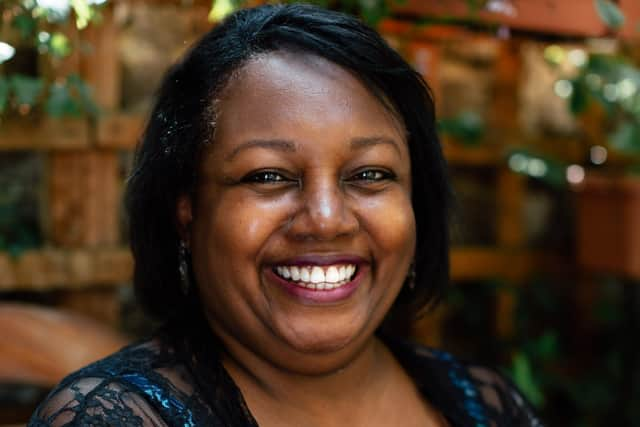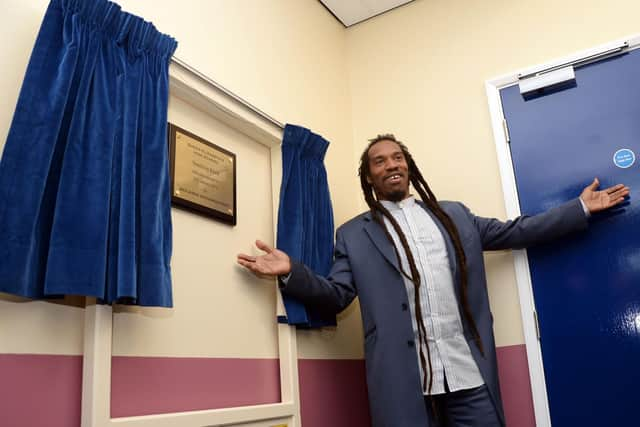Malorie Blackman on working through adversity, facing rejections and inspiring a new generation of writers ahead of appearance at Ilkley Literature Festival
Has Malorie Blackman’s life turned out like one of those novels she escaped to? She laughs. “I’ve never been asked that before. I don’t think it turned out like a novel.”
Yet her memoir is a story of trauma, trials and triumph. The trajectory of any Hollywood film. Homeless as a young girl after her father left; told by doctors she’d be dead by thirty after being diagnosed with sickle cell; more than 80 rejection letters from publishers.
Advertisement
Hide AdAdvertisement
Hide AdThen, an OBE for services to children’s literature, becoming Children’s Laureate, before going on to see her Noughts & Crosses series adapted into major BBC drama series.


Appearing at Ilkley Literature Festival on 22 October, Malorie will talk about her long-awaited autobiography, Just Sayin’ My Life in Words. “I’ve written over 70 books and I was 60 this year,” Malorie says, “so it felt like the right time to take stock, and just tell my story in the hope that others will feel they too have a voice.
"That’s why it’s called Just Sayin’ because in my case, I haven’t always been encouraged to use my voice, and I wanted to say to others, you can go through good times and bad times, but don’t let that stop you.”
It’s not surprising it’s been hailed by the likes of Benjamin Zephaniah as ‘inspiring’. Her way with words gave flight to her remarkable life journey, and that love affair began with libraries. She writes how they were “Godsends” away from a dysfunctional home. “I truly believe that if it wasn’t for them, I wouldn’t be here now.”
Advertisement
Hide AdAdvertisement
Hide AdThe cost-of-living crisis today is clearly an issue that resonates. Malorie says: “I read a story of a woman who had to travel on buses all day because she couldn’t afford to heat her home and the buses were warmer than her house. Now, we’re talking about using libraries as warm spaces for people who can’t afford to heat their own homes.


"And while it’s a solution, I think it’s shameful that this is what we have to resort to in 21st century Britain - that people are forced to leave their homes because they can’t afford to heat them, and having to seek out warm spaces like libraries.”
The worst, she says, is libraries have been so badly cut. “Since 2010, over 800 libraries have closed. I couldn’t afford books as a child. For me, libraries were a lifeline. They’re free, that’s the beauty of them, they are true equal spaces, rich, poor, in between, you can go and use them.
"Unfortunately for all the talk of social mobility, I think the gap between those that have and those that have not, is growing wider and wider, and I think this common crisis with energy, and people struggling and rents and mortgages going up, is going to leave some people in absolute dire straits. It’s something I can relate to.”
Advertisement
Hide AdAdvertisement
Hide AdMalorie says most of her books are written “to entertain children and young adults” and “maybe provoke discussion and debate.”
“Books absolutely do provide escapism and entertainment, and that’s why they’re important, but also provide a tool for telling children and teens who are going through things that they’re not alone, that there are others who have been through something similar to what they’re going through and have come out the other side. I think that’s also a really important message.”
Does she write with a particular audience in mind? “If I’m writing to anyone, it’s for the child in me, and I hope others will be on board for that.”
It’s not surprising then that she’s described writing as an act of therapy. “It’s almost like a psychiatrist couch, as I can pour thoughts and feelings into my stories and some of my books are based on things that happened to me, some are just pure imagination. "It’s a way of thinking, what would have happened if I’d taken this path, rather than that path? To explore that through my characters. But my characters are all from imagination, I don’t write about people I know.”
Advertisement
Hide AdAdvertisement
Hide AdMalorie worked as a computer programmer before her writing career took off. Her resilience and persistence is remarkable, her drive to keep going, despite rejection letter after rejection letter.
“Reading led to writing, then I started taking courses in writing. I just found the thing I loved doing. It was just a love of telling stories. Something clicked inside my head, and I thought, this is what I want to do. It was a case of, I wasn’t going to give up because I knew I’d found what I wanted to do for a lifetime.”
Stories, or any creative expression, is important for all of our mental well-being, she says. “It should be STEAM not STEM: Science, Technology, Arts, Engineering and Maths. We need the arts for good mental health and to be well-rounded human beings.
"When we had lockdown, that’s what we turned to: watching films, or reading books or TV programmes or playing music, all the very subjects we’re being told are as not as important. That’s not disparaging science and maths but we absolutely need the arts.”
Advertisement
Hide AdAdvertisement
Hide AdShe says: “I hope if I do anything I’ve inspired maybe some people to consider writing as a career, or any kind of creative arts. Or to know that if they really want something, not to give up at the first rejection, or the first 50 rejections. If you really want it, to keep going for it. If I’ve done anything, I’d hope other people can look at me and say, if she can do it then so can I.”
Malorie Blackman is at Bradford Grammar School tomorrow, October 22, at 7pm. To book, visit ilkleyliteraturefestival.org.uk